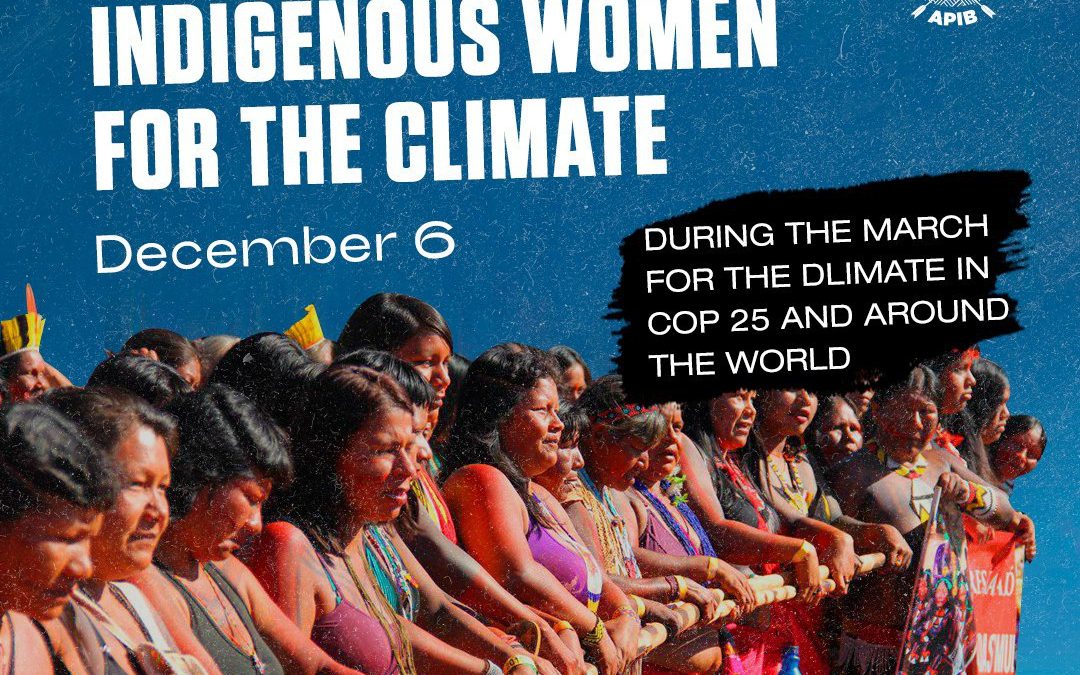
05/Dec/2019
The indigenous women from the most diverse peoples of Brazil make a call for everybody to join in this great global action for climate and life on the planet. On this Friday, December 6th, social movements, activists, environmentalists, young people and all those who understand the climate emergency will march together at the Climate March that takes place during COP 25, in Madrid . Take part at it too, organize your collectives, call friends, activists and social movements to speak up wherever you are on Friday.
Greed is killing our forests, our woods, our rivers; attacking our right of being and existing in our diversity. The world needs other models of development, we have to put a stop on this killing! Indigenous women are at the forefront of this struggle for the defense of mother earth and the preservation of their traditional ways of life! Join us!
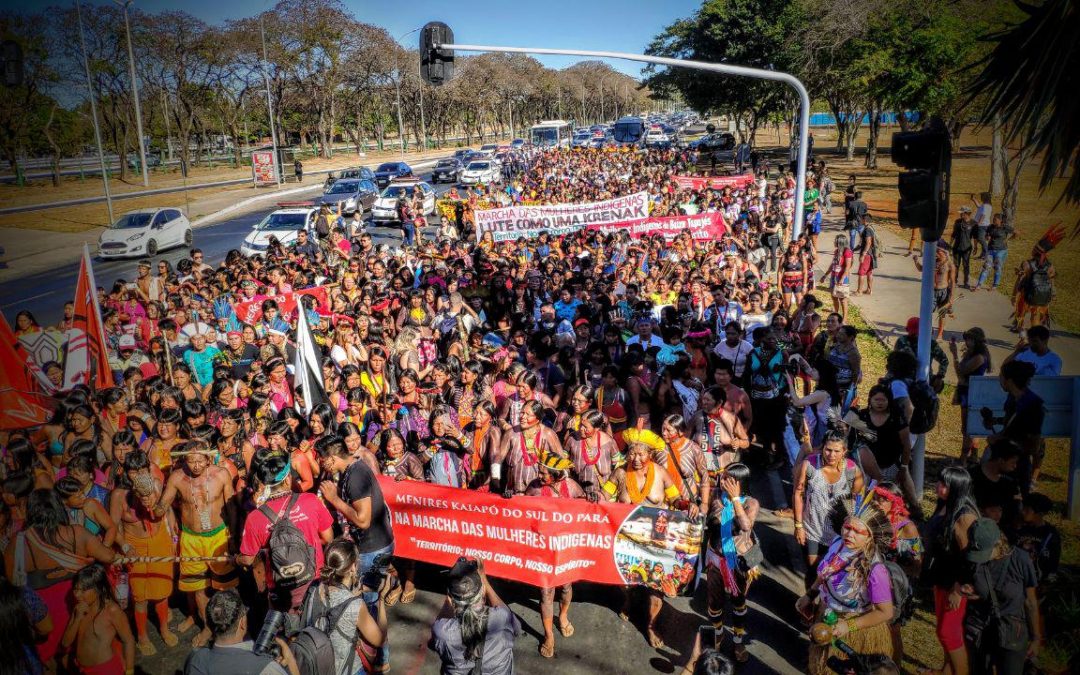
12/Aug/2019
By Luma Lessa for Collaborative Coverage of the Indigenous Women’s March (translated by Daiara Tukano
Sunday (08/11) dawned with the cultural presentations of women’s delegations from over 100 indigenous peoples from all over Brazil. Then about 1,500 indigenous women gathered for the activities of the Indigenous Women National Forum. Sonia Guajajara opened the event by inviting women from 21 states to talk about the theme: “Territory: our body, our spirit.” The discussions addressed the building of concrete demands and strategies of indigenous women for their empowerment, the violation of health, education and security rights, the right to land and resumption processes, and the occupation of indigenous women in politics.
In the afternoon, tables brought guests to discuss networking between movements. Joenia Wapichana, Federal Deputy (Rede-RR), indigenous women from Latin America, indigenous representatives from Peru and Ecuador, and a representative of UN Women Brazil attended the meeting. There was also the roundtable for National Alliances, which was attended by representatives of the Brazilian Articulation of Indigenous Peoples (APIB), the March of Daisies, Black Women, Brazilian Women’s Articulation (AMB) and the National Coordination of Quilombola Rural Black Communities (CONAQ).
In Monday (12/08) the focus is the “Indigenous Women in Defense of Indigenous Health SASI-SUS” Act. The march left the headquarters of the camp in Funarte towards the Special Secretariat of Indigenous Health (Sesai). The first walk of the 1st Indigenous Women March took to the streets of Brasilia to protest the end of The indigenous Health System municipalization and the immediate departure of Silvia Nobre, current coordinator of the SESAI. The arrival at the secretariat faced the attempt of the Military Police to block the entrance of the indigenous leaders to the building. However, the women managed to enter and occupy the space. The day ends with the participation of a women’s delegation in the hearing, scheduled to start at 17h, in the Supreme Court (STF).
The walk continues tomorrow, August 13th, at 7:00 am with the departure from the Indigenous Women’s March from the main camp at FUNARTE towards the Esplanade of Ministries. The March joins the National Act Against Dismantling of Public Education, scheduled for 9am. At the same time will take place the Solemn Chamber of Deputies with the Daisies. In the afternoon, there are workshops and activities with the Daisies in the City Park, followed by the opening of the Daisy March at 19h in the same place.
The Indigenous Women March ends on Wednesday (14/08), joining forces with the March of Daisies in a joint walk. The daisies and indigenous meeting will take place at Funarte. The expectation is about 100 thousand people for the March 13 and 14 August. The last activity of the day, scheduled for 2 pm, will be the Plenary for the approval of the Final Document with the theme “Watering Seeds: The Future of the Forum and the Indigenous Women March”. In the end, delegations return to their places of origin renewed with the forces and strategies shared between indigenous women of diverse peoples and with peasant women in these intense days of mobilizing the largest female action in Latin America.
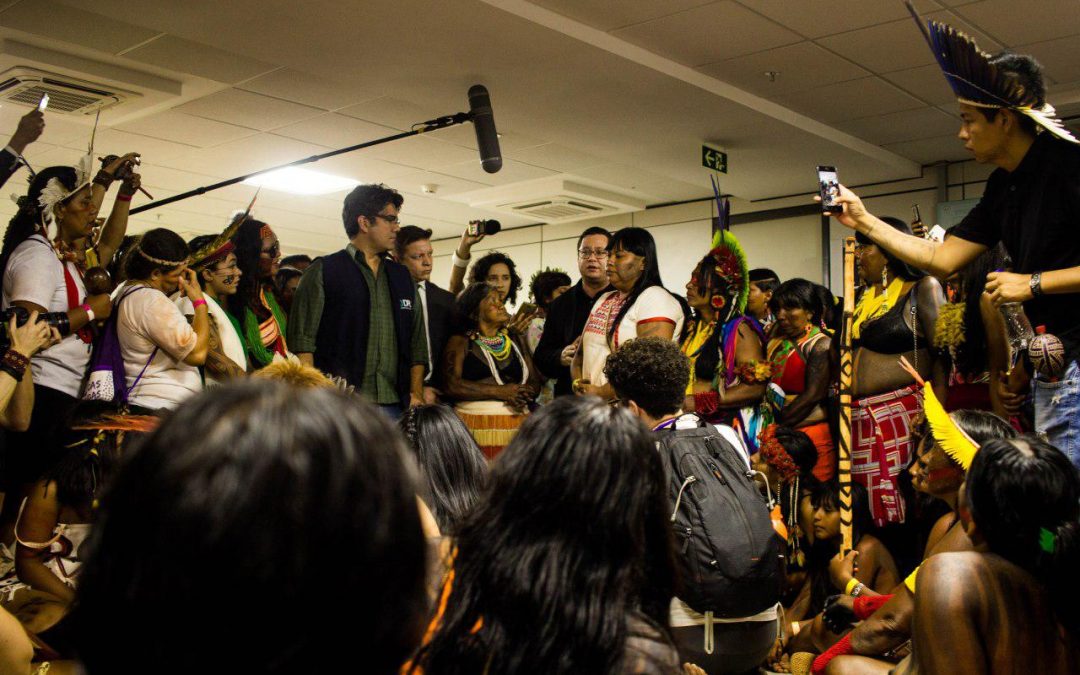
12/Aug/2019
By Andressa Santa Cruz, and free translation by Mahe Maia, for Collaborative Coverage of the Indigenous Women’s March
Hundreds of indigenous women occupied the building of the Special Secretariat of Indigenous Health (SESAI) today in Brasilia, calling for an end to the dismantling of indigenous health and the immediate departure of coordinator Silvia Nobre Wajãpi who declined to meet with the leaders and left the building under crowd boos. “Silvia does not represent the majority of indigenous women. We came here to talk and were not received. This shows the contradiction.”says Celia Xakriaba.
Since Silvia Nobre was designated by the current government in April, indigenous health policies have been weakened. The delay to transfer funds, the dismantling of the“More Doctors”Program, and the termination of the management team, impacted the villages since the first month, when indigenous across the country began to mobilize against the scrapping. In July, 115 indigenous camped in the SESAI building for two weeks and only left on the 22nd, after a meeting mediated by the Federal Prosecutor’s Office and Funai, in Brasilia, when the Ministry of Health and SESAI signed an Adjustment Agreement of Conduct (TAC) committing to accomplish the demands.
For Nyg Kaigang, from the south of the country, one of the objectives is the revitalization of the organ, “we will strive to ensure a specific health care based on the alignment of knowledge of traditional medicine, the way we think about the healing of our bodies”.
Check the moment of entry into the building:

Indigenous women occupy Sesai building demanding the immediate departure of coordinator Silvia Nobre. Photo: Douglas Freitas

Indigenous women occupy corridors and rooms of Sesai – Special Secretariat of Indigenous Health in Brasilia. Photo: Douglas Freitas / Collaborative Coverage

Indigenous women occupy Sesai building demanding the immediate departure of coordinator Silvia Nobre. Photo: Kamikia Kisedje / Collaborative Coverage

Indigenous women occupy corridors and rooms of Sesai – Special Secretariat of Indigenous Health in Brasilia. Photo: Lia Biachini / Collaborative Coverage

Indigenous women occupy Sesai building demanding the immediate departure of coordinator Silvia Nobre. Photo: Kamikia Kisedje / Collaborative Coverage

Indigenous women occupy Sesai building demanding the immediate departure of coordinator Silvia Nobre. Photo: Kamikia Kisedje / Collaborative Coverage

Indigenous women occupy Sesai building demanding the immediate departure of coordinator Silvia Nobre. Photo: Daniela Huberty / Collaborative Coverage
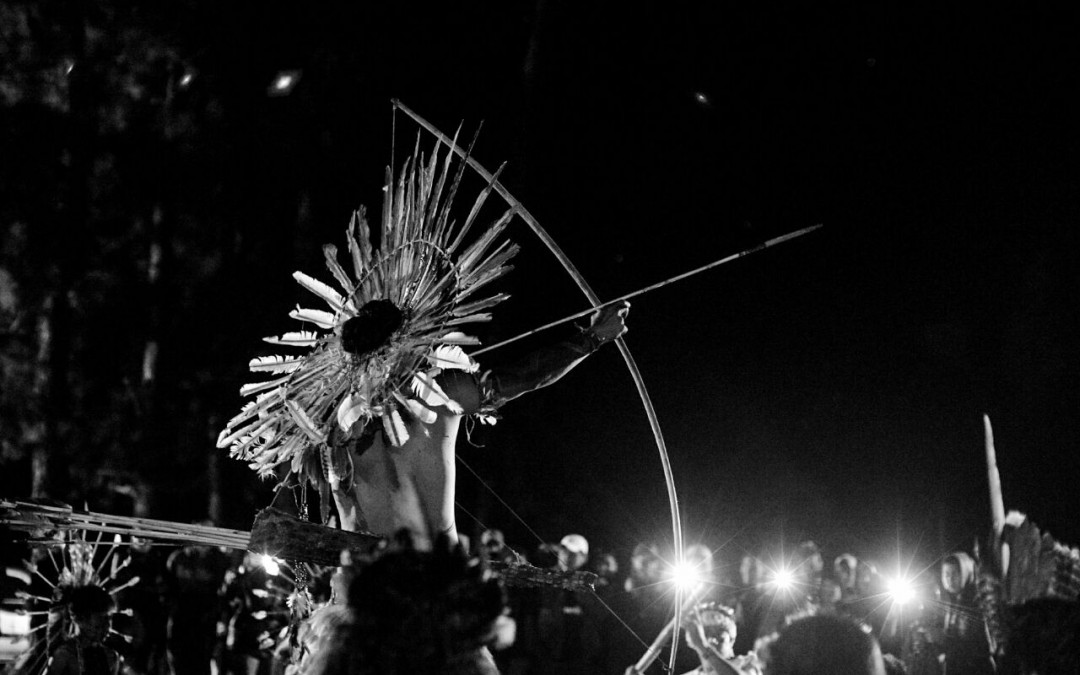
08/Jun/2017
GENEVA / WASHINGTON DC (8 June 2017) – Three United Nations experts and a rapporteur from the Inter-American Commission on Human Rights have joined forces to denounce attacks on indigenous and environmental rights in Brazil.
“The rights of indigenous peoples and environmental rights are under attack in Brazil,” said the UN Special Rapporteurs on the rights of indigenous peoples, Victoria Tauli Corpuz, on human rights defenders, Michel Forst, and on the environment, John Knox, and the IACHR Rapporteur on the Rights of Indigenous Peoples Francisco José Eguiguren Praeli.
Over the last 15 years, Brazil has seen the highest number of killings of environmental and land defenders of any country, the experts noted, up to an average of about one every week. Indigenous peoples are especially at risk.
“Against this backdrop, Brazil should be strengthening institutional and legal protection for indigenous peoples, as well as people of African heritage and other communities who depend on their ancestral territory for their material and cultural existence,” the experts stated. “It is highly troubling that instead, Brazil is considering weakening those protections.”
The experts highlighted proposed reforms to the National Indian Foundation (FUNAI), the body which supports indigenous peoples in the protection of their rights, and which has already had its funding severely reduced. A report recently adopted by the Congressional Investigative Commission calls for the body to be stripped of responsibility for the legal titling and demarcation of indigenous lands. The experts were also concerned with allegations of illegitimate criminalization of numerous anthropologists, indigenous leaders and human rights defenders linked to their work on indigenous issues.
“This report takes several steps back in the protection of indigenous lands,” the experts warned. “We are particularly concerned about future demarcation procedures, as well as about indigenous lands which have already been demarcated.”
The Congressional Investigative Commission’s report also questions the motives of the United Nations, accusing it of being a confederation of NGOs influencing Brazilian policy through its agencies, the ILO Convention 169, and the UN Declaration on the Rights of Indigenous Peoples.
“The report also states that the UN Declaration presents a grave threat to Brazil’s sovereignty, and it further encourages the Brazilian government to denounce ILO Convention 169, claiming it manipulates the establishment of non-existent indigenous peoples in order to expand indigenous lands in Brazil,” the experts stressed.
“It’s really unfortunate that instead of exemplifying the principles enshrined in the Declaration, the Congressional Investigative Commission questions the motives behind it and those of the UN itself, and waters down any progress made so far,” they said.
Ms. Tauli Corpuz expressed particular alarm at accusations that her 2016 visit to Brazil intentionally triggered an increase in the number of indigenous peoples reclaiming their lands, exposing them to further violence. She highlighted the fact that some of these communities suffered attacks immediately following her mission.
The human rights experts also noted that a number of draft laws establishing general environmental licensing that would weaken environmental protection were being circulated in Congress on Friday 2 June. For example, the proposed legislation would remove the need for environmental licenses for projects involving agri-business and cattle ranching, regardless of their size, location, necessity, or impact on indigenous lands or the environment.
“Weakening such protections would be contrary to the general obligation of States not to regress in the level of their protections of human rights, including those dependent on a healthy environment,” they stressed.
The experts warned that the proposed laws were at odds with the American Declaration on the Rights of Indigenous Peoples, which guarantees the rights of indigenous peoples to the conservation and protection of the environment, and protects the productive capacity of their land and resources.
Both the report and the draft legislation had been submitted by members of the “ruralist” lobby group, a coalition representing farmers’ and ranchers’ associations, the experts noted.
“Tensions over land rights should be addressed through efforts to recognize rights and mediate conflicts, rather than substantially reducing the safeguards in place for indigenous peoples, people of African descent and the environment in Brazil,” they said.
The UN experts are in contact with the Brazilian authorities and closely monitoring the situation.
Ms. Victoria Tauli-Corpuz, Special Rapporteur on the rights of indigenous peoples, Mr. Michel Forst, Special Rapporteur on the situation of human rights defenders, and Mr. John H. Knox, Special Rapporteur on the issue of human rights obligations related to the enjoyment of a safe, clean, healthy and sustainable environment are part of what is known as the Special Procedures of the Human Rights Council. Special Procedures, the largest body of independent experts in the UN Human Rights system, is the general name of the Council’s independent fact-finding and monitoring mechanisms that address either specific country situations or thematic issues in all parts of the world. Special Procedures’ experts work on a voluntary basis; they are not UN staff and do not receive a salary for their work. They are independent from any government or organization and serve in their individual capacity.
Mr. Francisco José Eguiguren Praeli, Rapporteur on the rights of indigenous peoples of the Inter-American Commission on Human Rights, was elected on June 16, 2015, by the OAS General Assembly, for a 4-year mandate ending December 31, 2019. A principal, autonomous body of the Organization of American States (OAS), the IACHR derives its mandate from the OAS Charter and the American Convention on Human Rights. The Inter-American Commission has a mandate to promote respect for human rights in the region and acts as a consultative body to the OAS in this area. The Commission is composed of seven independent members who are elected in an individual capacity by the OAS General Assembly and who do not represent their countries of origin or residence.
UN Human Rights, country page: Brazil
For more information and media inquiries, please contact Ms. Hee-Kyong Yoo (+41 22 917 97 23 / [email protected]), Ms. Christine Evans (+41 22 917 9197 / [email protected]) or write to [email protected]
For media inquiries related to other UN independent experts:
Xabier Celaya, OHCHR Media Unit (+ 41 22 917 9383 / [email protected])
Tag and share – Twitter: @UNHumanRights and Facebook: unitednationshumanrights
Concerned about the world we live in? Then STAND UP for someone’s rights today. #Standup4humanrights and visit the web page at http://www.standup4humanrights.org
– See more at: http://www.ohchr.org/EN/NewsEvents/Pages/DisplayNews.aspx?NewsID=21704&LangID=E#sthash.MYSvR3dS.dpuf
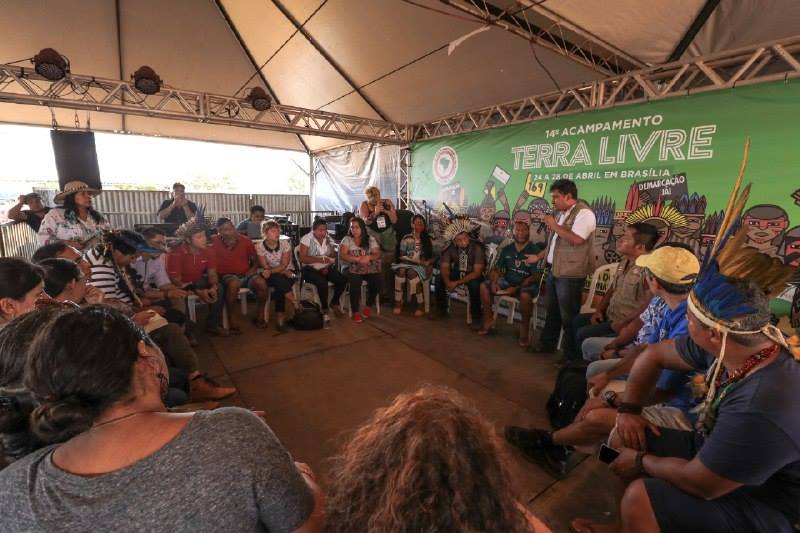
30/Apr/2017
Terra Livre Camp, that happened this week in Brasília, not only received brazilian indigenous leaderships, but also from other coutries, such as the Alianza de Pueblos Indígenas del Archipiélago (AMAN), the Alianza Mesoamericana de Pueblos y Bosques (AMPB) and the Coordinación de Organizaciones Indígenas de la Cuenca Amazónica (COICA), which sent a thanking and invitation letter to APIB, strenghtening even more the unity among Americas indigenous peoples, and also the fights and agendas inherent to all the originary peoples. Read the letter! Letter international Delegation
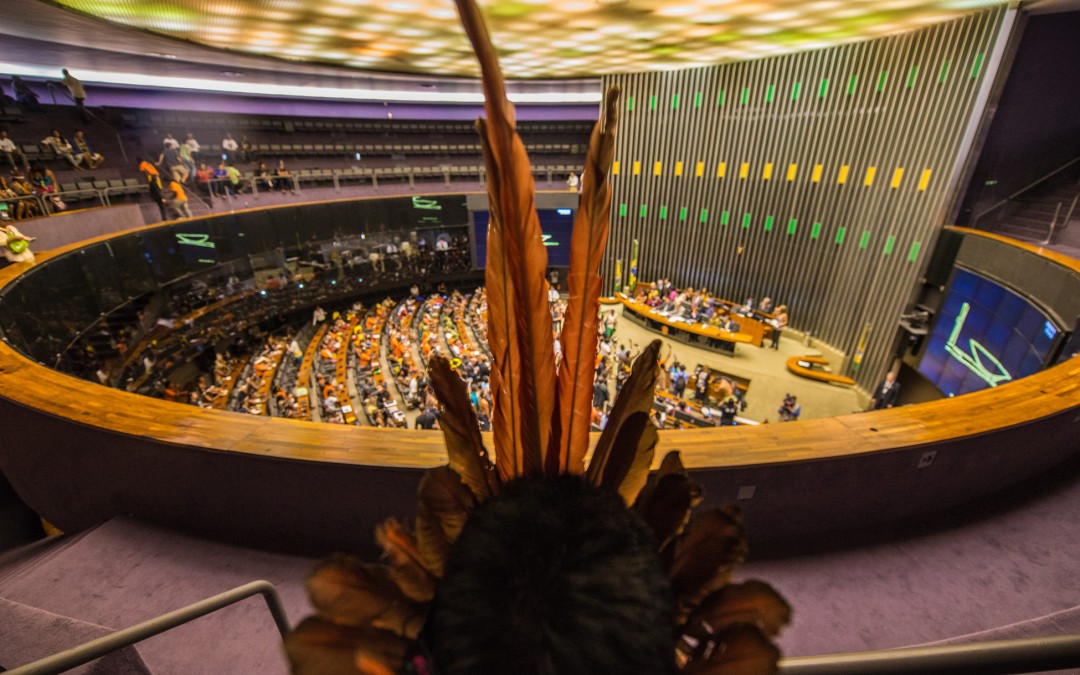
12/Apr/2017
On the last few years, Brazil’s indigenous people have been facing strong pressures that have intensified in all state power spaces. In parliament, have prevailed in all its levels, the the interest of groups mostly against indigenous peoples rights. In view of that is on the parliament that builds legal regulations that bind the whole society, it makes necessary to see this space as strategic to the empowerment of our people and achieve in an effective way that our struggles and agendas to be evidenced and transformed in resistance and power instruments in this accentuated context of strength correlation and of permanent attacks to the indigenous rights.
The damaged caused in Municipal councils that have indigenous populations are evident, and on the State Congresses, but without indigenous representation. Such losses are even bigger on the National Congress scope that on its composition does not even have an indigenous. This feature of legitimate representatives of indigenous peoples absence gives way to the strong reactionary, fundamentalist, and financial group’s interests agenda, highlighting the ruralist group, that historically acts as enemies of Indigenous People.
On the last City elections, we’ve acted strongly on the incentive of indigenous applications all over brazilian territory. This tactics resulted on important results. Hundreds of indigenous candidates runned to city councilors and mayors in several citiies of the country. We’ve reached the historical mark of 167 indigenous elected as city councilors and 5 indigenous elected mayors on their birth city, which we believe will defend a progressive and positive agenda that has in its chorum the struggle and claims of originating people and traditional communities, the human rights schedule, the environment and democracy defense, finally, the set of social policies conquered by all brazilian society.
However, the political system is antique, grounded on the economical power and instrumentalized by the elites of this country. For those reasons, it makes necessary to keep fighting for the political reformation, that is not reduced to the electoral reformation, to assure the traditionally marginalized society distinct segments power spaces and real and participative democracy, that allows for instance to the indigenous peoples the electoral dispute participation, being through the classic partisan path, of different electoral colleges or own autonomous social organization mechanisms, decision collective spaces. Considering that in 2018 all over the country will be focused on state and national elections to state and federal Congress, governors and Country President, the focus is that our people act no longer as mere supporting on the election process. That is why we call all the Brazil’s indigenous people that from now on, start their discussion on the local and regional scope about the need to launch even more indigenous candidates to the next elections dispute, encouraged warriors, willing to occupy the state parliament and National Congress.
Take this indigenous people struggle agenda to the political debate must be seen as a mission of all the brazilian indigenous movement.
By an increasingly indigenous parliament.
Brasília-DF, January 31st 2017.
Brazil’s Indigenous People Articulation – APIB
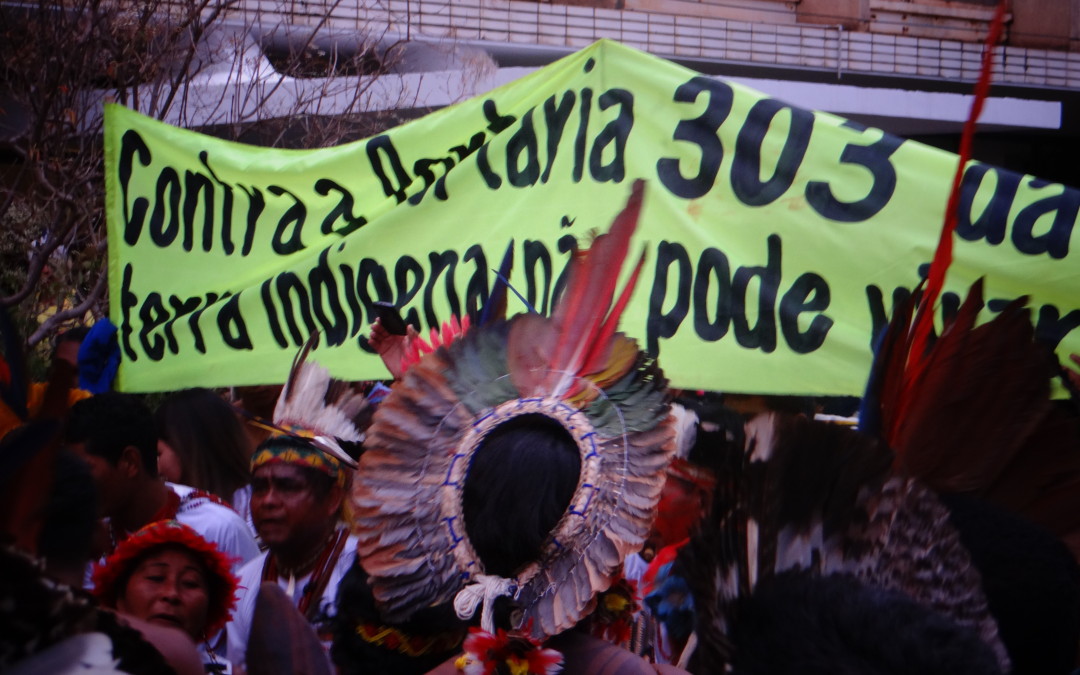
12/Apr/2017
Guarani Kaiowá and Ñandeva from Aty Guasu and Terena Board indigenous leaderships, peoples from Mato Grosso do Sul, besides directors of Brazil’s Indigenous People Articulation (Apib), have been to the Justice Ministry, on this friday early afternoon, 28, to reinforce complaint against the racist attacks of Luiz Carlos Heinze (PP/RS) and Alceu Moreira (PMDB/RS) congressmen (see here) and to express concern about the PEC 215 Special Commission.
“The racist attacks from the ruralists Congressmen happened in a Federal Congress public hearing. To the PEC 215, the ruralists already pledged about 20 hearings. We fear that these hearings are fit to, once again attack us in a racist way, with hate”, highlights Lindomar Terena.
The group was heard by representatives of National Security Secretary and the Indigenous Matters Special Advisory, ministry organisms. Territorial demands, besides protests against Ordinance 303, were also addressed at the meeting.
“We experienced a shameful State powers and capital owners or representatives agreement, to the detriment of our people constitutional rights. A virulent criminalization, delegitimizing, discrimination, racism and originary people extermination campaign”, says piece of the complaint-letter filed with the ministry.
Read in full:
TO THE MOST EXCELLENT MR. JOSÉ EDUARDO MARTINS CARDOZO STATE MINISTER OF JUSTICE
Valued Sir Minister,
We, indigenous leaderships signed above, in name of the Brazil’s Indigenous People Articulation – APIB, of the Guarani Kaiowá Great Council (Aty Guassu) and the Terena People Board, mobilized in Brasília – DF, we hereby denounce to your honor the intensified attacks promoted against our peoples rights, with great concern on this election year, by distincts society economical and political powers and from the brazilian State, that try to perpetuate, at any cost primarily the agro-export development model that make it viable their power, accumulation and profit interests, and appropriating and dispossession of our territories.
We experienced a shameful State powers and capital owners or representatives agreement, to the detriment of our people constitutional rights. A virulent criminalization, delegitimizing, discrimination, racism and originary people extermination campaign which seeks to legalize the assault and usurpation of indigenous territories and their wealth. Hence the commitment of these enemies to prevent in any way the demarcation of the few lands that were left with the colonial invasion.
Are part of this campaign:
- Public hearings promoted on distinct country regions by the Farming Parliamentary Front, with the purpose of giving the unconstitutional PEC 215 legality, that seeks to impair the indigenous, quilombola and preservation unities territorial rights effectiveness. On the other hand, said hearings, has been constituted in real stages of incitement to crime, to hatred, to racism and to the violence against our peoples and other marginalized segments of the population, just like happened in november 29th, 2013, in Vicente Dutra-RS county. We reported specially the speeches made by Luiz Carlos Heinze (PP/RS) and Alceu Moreira (PMDB/RS) congressmen, with absurd and unacceptable improprieties against homossexual, prostitutes, quilombolas and, specially, against the indigenous peoples. We delivered, to your knowledge, investigation and punishment video of this parliamentarians that gathers these sayings that on our understanding constitute crime, human rights attempt and rule of law disrespect.
- The Ordinance Nº 27, from february 7 2014, of the Union attorney general-UAG, Luís Inácio Lucena Adams, that determines to Union General Consulting – UGC and to the Litigious General-Secretary – SGCT the content adequacy analysis of AGU ordinance nº 303, from july 16, 2012, published on the I=Union Official Journal, Section 1, from february 17, 2012, to the terms of the judgment delivered by the Federal Supreme Court in the Petition Nº 3388. The trick obviously that the controversial and challengeable Ordinance 303, already in force , become law, as claimed by the agro-business representatives and the ruralist stand since 2012 which Minister Adams is a faithful subservient. Considering that the same is an affront to the International Labour Organization (ILO) Convention 169 and responsible by worsening legal and social insecurity, violence actions, persecutions, threats and murders acted against indigenous peoples and communities promoted by their land invaders we claimed from Dilma’s government its immediate and definite revocation.
The same way we claim the revocation of other published instruments by the Executive Power such as the Ordinance 2498, from october 31st, 2011, that determines the summoning of federated beings to participate from indigenous lands identifying and delimitation procedures, the Interministerial Ordinance 419 from october 28, 2011, that restricts the term to the public administrations organs and entities expedite infrastructure that reach indigenous lands environmental licensings, and the Decree nº 7.957, from march 13, 2013, that institutes state instrument to Militarized repression of any action of the indigenous peoples, communities, organizations and social movements that decide to stand against enterprises that impact their territories.
- These rushes add to the voracious desire of the ruralist group to tear up the Federal Constitution that assures the indigenous rights to the lands they traditionally occupy. Are used for this purpose legislative different initiatives among which stand out the PEC 215, PLP 227, and the PL 1610 of indigenous lands mining.
In the face of this backdrop of threats to our peoples rights noticeably sharpened in regions as Mato Grosso do Sul, Amazonas, Bahia south, among others, we ask to Dilma’s government, specially to the ministry that your honor preside, the attendance to our demands hereby presented, prioritizing immediately our land demarcation, whose lacks contributes to the increase and aggravation of the actual picture of violence against our people.
Best regrards.
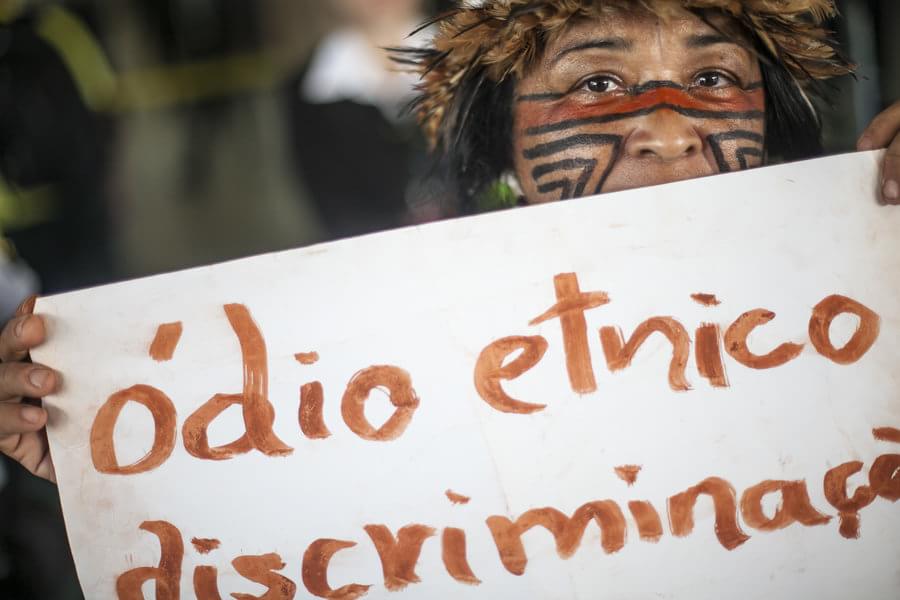
12/Apr/2017
APIB Public note
The Justice Minister declarations, the ruralist Osmar Serraglio, sworn in on the last 7th day, and published by Folha de São Paulo today, 3/10, demonstrate which side he is. His initial State Justice minister speeches give sequence to his notorious ignorance about indigenous peoples history, identity, culture and cosmovision and reaffirm his traditional vision and parliamentary practices that doesn’t respect this peoples, prejudiced and racist, and declared agro-business causes defender, as demonstrated by being reporter of PEC 215/00.
On the attempt to unqualify indigenous people originary and permanent territorial rights, recognized by constitutional letter of 1988, he affirms that the involved in countryside conflicts should stop arguing about lands, because they “do not fill anyone’s belly” and the indigenous just need “good life conditions”.
That is, the justice minister want the indigenous people to calm down, stop claim and cry out for respect of their land sacred right, trampled secularly by successive generations of invaders including Serraglio, for which the land only has one purpose: give profit at any cost, even though that implies destruction and death, of territories and peoples, of common assets, knowledges and millennial wisdom. At the end, to the old colonizers and new colonizers, remains to offer to the extermination survivors the faith to integrate integrating their world – capitalism -, without what is fundamental to their existence: the land and mother nature, that is far from being just a production mean, an external reality to be win and destroyed to achieve the goals of accumulation, profit, enrichment and consumption to exhaustion.
“Good life conditions” to the indigenous people, Mr. Minister, will ever come without the guarantee of living in peace and free on their territories, with sustainability dignified conditions, that presuppose to overcome the archaic thought of tutelary policies, assistencialism, paternalistic and authoritarian on which the State taken by the economic elite, from which you belong, have treated the indigenous people, robbing them the land and the exclusive usufruct right guaranteed by the Federal Constitution, based on juridic arguments and fallacious speeches, parliamentary and judiciary maneuvers, including the use of force.
To pacify the countryside crisis is enough that you order to unarm the militias and the agro-business farmers that murdered indigenous leaderships Brazil beyond, and keep the Magna Carta that 29 years ago determined that the Union demarcate the indigenous lands in five years.
Brasília – March 10th, 2017.
Brazil’s Indigenous People Articulation – APIB
Indigenous National Mobilization















